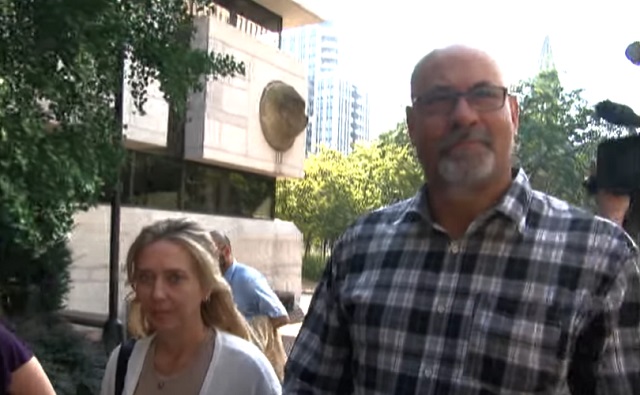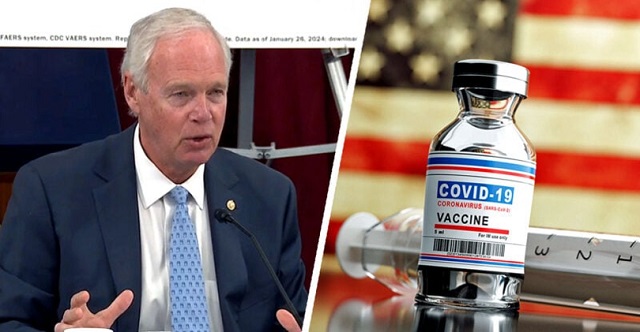COVID-19
Freedom Convoy leaders’ lawyers argue defendants encouraged peaceful protesting

From LifeSiteNews
Freedom Convoy leader Chris Barber’s legal counsel argued that text messages he sent to both police and fellow protesters during the convoy prove he was not encouraging people to commit crimes
On day 30 of the trial against Freedom Convoy leaders Tamara Lich and Chris Barber, the defense detailed to the court how text message exchanges from one of the leaders showed he was trying to ensure protestors were as respectful as possible and wanted to work with police.
According to a day 30 update from the Democracy Fund (TDF), which is crowdfunding Lich’s legal costs, defense counsel for Barber, Diane Magas, said that a text conversation between Barber and an “individual known as ‘Big Baller,’” show that “Barber expressed his efforts to cease honking and persuade other truck drivers to follow suit,” in attempt to abide by law enforcement’s request.
Magas also highlighted how a text message exchange between Barber and an Ottawa Police Services (OPS) officer, asking for a “slow roll” on Parliament Hill, “received police support.”
“These instances, according to Magas, illustrated Barber’s intent for a lawful protest,” noted TDF.
Magas questioned the Crown’s allegation that the leaders had planned a conspiracy, noting a February 12, 2022, agreement letter between the convoy protesters and the mayor’s office.
“She questioned whether the Crown implied the mayor’s office was part of the alleged conspiracy,” noted TDF.
“Magas highlighted a TikTok video on February 16, 2022, with Barber and Canadian lawyer Keith Wilson, where Wilson emphasized that the declaration of the Emergencies Act still permitted peaceful protests. Magas concluded her submissions by asserting that, considering the totality of evidence, the court couldn’t find an agreement for the alleged conspiracies without speculation.”
In response, the Crown’s counsel said that a “directed verdict would be appropriate if there were no evidence of criminality,” but again argued for their Carter application to proceed.
On Monday, which was Day 28 of the trial, the defense argued that a Crown request to make it so that criminal charges against one leader should apply to the other leader as well, and vice versa, should not be allowed to take place, as there is no evidence the pair worked in a conspiratorial manner.
The defense teams for Lich and Barber told the court they intended to bring forth two applications, the first being a call to dismiss the Crown’s “Carter application.”
The Crown’s so-called “Carter Application” asks that the judge consider “Barber’s statements and actions to establish the guilt of Lich, and vice versa,” TDF stated.
TDF noted that this type of application is very “complicated” and requires that the Crown prove “beyond a reasonable doubt” that there was a “conspiracy or plan in place and that Lich was a party to it based on direct evidence.”
On Wednesday in court, the Crown claimed that they did not think of the protests as violent, but “disputed the defense’s characterization of the protests as peaceful.”
The Crown claimed that non-violent protests could still be “disruptive and result in criminal charges,” as noted by TDF, adding that the court should consider limitations to Charter rights when looking at charges made against the leaders.
In court, Judge Heather Perkins-McVey reminded the Crown that not everyone involved in the Freedom Convoy was working together. The Crown agreed this was the case.
On Day 29, Lich’s legal counsel argued that her use of the rallying cry “hold the line” during the 2022 protests did not imply she was calling for people to engage in illegal activity.
Lich and Barber are facing multiple charges from the 2022 protests, including mischief, counseling mischief, counseling intimidation and obstructing police for taking part in and organizing the anti-mandate Freedom Convoy. As reported by LifeSiteNews at the time, despite the non-violent nature of the protest and the charges, Lich was jailed for weeks before she was granted bail.
The defense’s application came after the Crown abruptly decided to end its case last Monday, telling the court it would not call forth any new witnesses.
In early 2022, the Freedom Convoy saw thousands of Canadians from coast to coast come to Ottawa to demand an end to COVID mandates in all forms. Despite the peaceful nature of the protest, Prime Minister Justin Trudeau’s government enacted the Emergencies Act on February 14.
During the clear-out of protesters after the EA was put in place, one protester, an elderly lady, was trampled by a police horse, and one conservative female reporter was beaten by police and shot with a tear gas canister.
Lich and Barber’s trial has thus far taken more time than originally planned. LifeSiteNews has been covering the trial extensively.
COVID-19
Senator Demands Docs After ‘Blockbuster’ FDA Memo Links Child Deaths To COVID Vaccine


From the Daily Caller News Foundation
By Emily Kopp
The letter, exclusively shared with the Daily Caller News Foundation, seeks more details about those deaths and the passive U.S. vaccine safety surveillance system and complacent Food and Drug Administration (FDA) bureaucracy under the Biden administration that delayed their reporting for years.
“Nobody wanted to admit that these things were causing death. This is absolutely a case of willful ignorance,” Johnson said in an interview with the DCNF.
As a nonprofit, we are dependent on the generosity of our readers.
Please consider making a small donation of any amount here.
Thank you!
The letter requests from the Department of Health and Human Services (HHS) “all records referring or relating to the review of the 96 reports of death following a COVID-19 vaccine … including but not limited to, any memorandum or report created following that review and the data underlying the reports.”
“I am grateful that we now have individuals at our federal health agencies who care about vaccine safety and efficacy. I am, however, disappointed that despite having subpoenaed HHS for the type of data and information described in Dr. Prasad’s memo, it does not appear to have been provided to my office,” the letter reads.
HHS did not immediately respond to a request for comment.
“This is a profound revelation. For the first time, the US FDA will acknowledge that COVID-19 vaccines have killed American children. Healthy young children who faced tremendously low risk of death were coerced, at the behest of the Biden administration, via school and work mandates, to receive a vaccine that could result in death. In many cases, such mandates were harmful. It is difficult to read cases where kids aged 7 to 16 may be dead as a result of covid vaccines,” Prasad wrote. “There is no doubt that without this FDA commissioner [Marty Makary], we would not have performed this investigation and identified this safety concern. This fact also demands serious introspection and reform.”
“One reason I’m writing this letter is that this memo needs much greater attention. This should be a blockbuster,” the Wisconsin senator told the DCNF.
Johnson, who has investigated the issue of COVID vaccine-linked adverse events since June 2021, also seeks more clarity about why FDA only examined a fraction of total reports to the Vaccine Adverse Event Reporting System (VAERS). He noted that the 96 deaths scrutinized by FDA staff in its investigation represents a sliver of the raw VAERS reports of 9,299 deaths worldwide within two days of vaccination.
Distinguishing which VAERS reports indicate genuine fatal side effects and which represent mere coincidences requires autopsy reports, which regulators and physicians often do not request because of a ideological reluctance to acknowledge that vaccines can carry risks, Johnson told the DCNF. Johnson said he has spoken to families who suspected a vaccine injury but struggled to obtain autopsies.
“With some of these officials at federal health agencies and within the medical establishment, vaccines are religion. The do not want to muddy the water with facts,” he said.
Johnson’s letter notes that Prasad acknowledged a culture at FDA “where vaccines are exculpated rather than indicted in cases of ambiguity,” and that the true number of deaths is likely higher.
Johnson has as chair of the Senate Permanent Subcommittee on Investigations investigated the Biden administration’s headlong expansion of COVID vaccines and booster shots to healthy young adults and children.
His committee uncovered internal federal documents showing the Centers for Disease Control and Prevention never updated its vaccine surveillance tool “V-Safe” to include cardiac symptoms, despite naming myocarditis as a potential adverse event by October 2020, per a May report. The investigation also found that top officials at FDA obstructed a warning to pediatricians and other providers about the risk of myocarditis after the May 2021 authorization of the Pfizer vaccine for 12 to 15-year-olds, months after Israeli health officials first detected the safety signal in February 2021.
Johnson’s letter highlights missing safety studies that the drugmakers never conducted.
Under the Biden administration, the FDA waived the responsibility of the drugmakers to conduct post-market studies that they had pledged to regulators, scientific advisors on the FDA Vaccines and Related Products Advisory Committee, and the public that they would complete. These uncompleted studies include promised research into subclinical myocarditis, undocumented rates of heart inflammation without obvious symptoms, Prasad’s memo states.
Johnson’s letter reveals the committee has not received any records from HHS about the liability shield for COVID-19 vaccines.
A public health media personality reported on Dec. 11 that FDA staff had downgraded the certainty with which it can attribute some the deaths to the vaccine in the weeks since Prasad received their top line results — echoing prior leaks from career officials aimed at undermining FDA’s new bosses.
Center for Drug Evaluation and Research Acting Director Tracy Beth Hoeg first concluded in a separate analysis that there were in fact deaths in children in the summer, but career staff leaked the results to reporters who “portrayed the incident as Dr. Hoeg attempting to create a false fear regarding vaccines” soon after, per Prasad’s memo.
Johnson’s letter seeks documentation of Hoeg’s meeting, including “a list of all attendees.”
COVID-19
China Retaliates Against Missouri With $50 Billion Lawsuit In Escalating Covid Battle


From the Daily Caller News Foundation
China is escalating its legal fight with Missouri after the state secured a massive court victory earlier this year over Beijing’s role in the COVID-19 pandemic, according to the state attorney general’s office.
Missouri Attorney General Catherine Hanaway announced Tuesday that the People’s Government of Wuhan Municipality, the Chinese Academy of Sciences and the Wuhan Institute of Virology have filed a $50 billion lawsuit against the state, claiming Missouri poses an “economic and reputational threat” to the People’s Republic of China (PRC). The suit comes as Missouri moves to seize Chinese-owned assets to collect on a historic federal court judgment the state won in March.
Missouri first sued China in 2020, seeking $25 billion in damages “for causing and exacerbating the COVID-19 pandemic” and for hoarding critical medical supplies while the virus spread, according to the state attorney general’s office. China and several affiliated entities were ordered to pay Missouri roughly $24.49 billion, plus post-judgment interest. Senior U.S. District Judge Stephen Limbaugh ruled that China and the other defendants “failed to appear or otherwise answer after being properly served,” resulting in the default judgment.
As a nonprofit, we are dependent on the generosity of our readers.
Please consider making a small donation of any amount here.
Thank you!
Missouri maintained that China was attempting to shield itself from legal consequences by relying on proxy organizations to speak on its behalf — an accusation Beijing now disputes in its own lawsuit against the state.
In its lawsuit, China alleges that Missouri’s actions have had “negative effects on the soft power” of Wuhan and have “belittled the social evaluation” as well as adversely affected the “productivity and commercialization of scientific and technological achievements” of the Chinese Academy of Sciences and the Wuhan Institute of Virology. The filing further alleges that Missouri’s “vexatious litigation” has “defamed Plaintiffs’ reputation, resulting in huge economic losses of the Plaintiffs, and deeply endangering sovereignty, security and development interests of China.”
The suit names the state of Missouri, Republican Missouri Sen. Eric Schmitt and the former Missouri Attorney General Andrew Bailey as the defendants.
China’s lawsuit demands the defendants “issue public apologies on New York Times, CNN, Wall Street Journal, Washington Post, YouTube and other American media or internet platforms, and People’s Daily, Xinhuanet and other Chinese media or internet platforms.”
Hanaway rejected the demand and said the state remains focused on enforcing the federal judgment.
“I find it extremely telling that the Chinese blame our great state for ‘belittling the social evaluation’ of The Wuhan Institute of Virology. This lawsuit is a stalling tactic and tells me that we have been on the right side of this issue all along,” Hanaway said in a statement. “We stand undeterred in our mission to collect on our $24 billion judgment that was lawfully handed down in federal court.”
Schmitt described China’s suit as “frivolous lawfare, attempting to absolve themselves of all wrongdoing in the early days of the pandemic.”
“This is their way of distracting from what the world already knows, China has blood on its hands. China lied about the origins of COVID virus, they tried to cover it up, and they upended the world by creating a global pandemic that resulted in immense human loss,” Schmitt added.
Missouri, Hanaway said, is continuing efforts to obtain certification that would allow the state to seize Chinese-owned assets, including real estate, financial interests, and other holdings tied to the defendants.
-

 International2 days ago
International2 days agoBondi Beach Shows Why Self-Defense Is a Vital Right
-

 Business2 days ago
Business2 days agoOttawa Pretends To Pivot But Keeps Spending Like Trudeau
-

 Censorship Industrial Complex2 days ago
Censorship Industrial Complex2 days agoHow Wikipedia Got Captured: Leftist Editors & Foreign Influence On Internet’s Biggest Source of Info
-

 Energy2 days ago
Energy2 days agoLiberals Twisted Themselves Into Pretzels Over Their Own Pipeline MOU
-

 Crime1 day ago
Crime1 day agoBondi Beach Survivor Says Cops Prevented Her From Fighting Back Against Terrorists
-

 Automotive1 day ago
Automotive1 day agoFord’s EV Fiasco Fallout Hits Hard
-

 Frontier Centre for Public Policy20 hours ago
Frontier Centre for Public Policy20 hours agoCanada Lets Child-Porn Offenders Off Easy While Targeting Bible Believers
-

 Crime2 days ago
Crime2 days agoThe Uncomfortable Demographics of Islamist Bloodshed—and Why “Islamophobia” Deflection Increases the Threat






